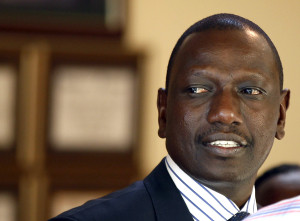The trial of Kenya’s deputy-president, William Ruto, opened this week at the International Criminal Court (ICC) in The Hague. Ruto, along with former radio presenter Joshua Sang are accused with orchestrating the violence that followed Kenya’s 2007 presidential election in which more than 1,000 people died. Both men are appearing at the ICC voluntarily.
Chief Prosecutor Fatou Bensouda accused Ruto and Sang of organising a “carefully planned, co-ordinated and executed campaign of violence targeting perceived PNU supporters,” referring to the allegation that the accused were responsible for directing gangs from their own Kalenjin tribe to attack members of the Kikuyu tribe. The Kikuyu, in the main, backed the victorious PNU party.
The prosecution alleges Mr Ruto organised militant groups and supplied them with weapons in advance of the elections, and gave the order to begin attacks after his party lost the elections. The atrocities committed included the deliberate burning alive of mostly Kikuyu women and children huddled together in a church in Kiambaa on 1 January 2008. Mr Sang is accused of using his radio station to advertise the militant groups’ meetings and of inciting violence by broadcasting inflammatory propaganda and anti-Kikuyu hate speech.
Both defendants pleaded not guilty to each of three charges of crimes against humanity: murder, forcible transfer of population, and persecution.
The case marks the first time the 10-year-old ICC has put such a high-ranking sitting political leader on trial.









